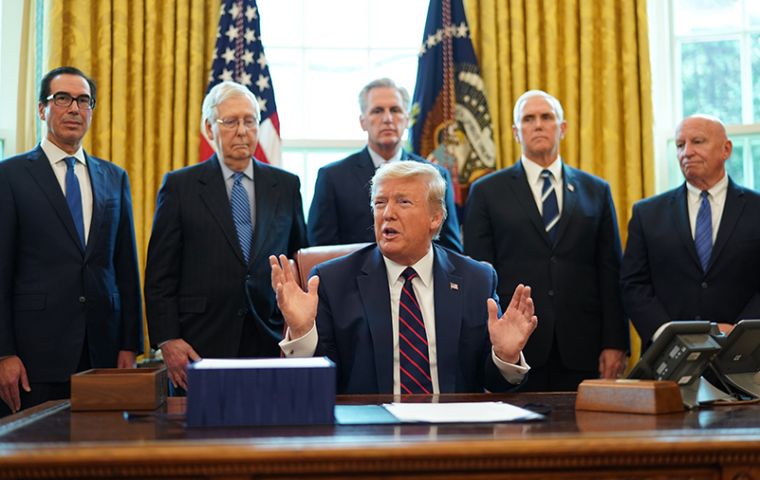MercoPress. South Atlantic News Agency
US approves the massive US$ 2,2 trillion package to cope with the pandemic
 The massive bill also rushes billions of dollars to medical providers on the front lines of the outbreak. President Trump is expected to sign it promptly into law.
The massive bill also rushes billions of dollars to medical providers on the front lines of the outbreak. President Trump is expected to sign it promptly into law.  “Our nation faces an economic and health emergency of historic proportions due to the coronavirus pandemic, the worst pandemic in over 100 years,” House Speaker Nancy Pelosi said
“Our nation faces an economic and health emergency of historic proportions due to the coronavirus pandemic, the worst pandemic in over 100 years,” House Speaker Nancy Pelosi said The US House of Representatives on Friday approved a US$2.2 trillion aid package - the largest in American history - to help people and businesses cope with the economic downturn inflicted by the coronavirus pandemic.
The massive bill also rushes billions of dollars to medical providers on the front lines of the outbreak. President Donald Trump signed it promptly into law Friday evening.
“Our nation faces an economic and health emergency of historic proportions due to the coronavirus pandemic, the worst pandemic in over 100 years,” House Speaker Nancy Pelosi said at the close of a three-hour debate on the House floor. “Whatever we do next, right now we're going to pass this legislation.”
Democrats and Republicans in the Democratic-led House approved the package on a voice vote, turning back a procedural challenge from Republican Representative Thomas Massie, who had sought to force a formal, recorded vote.
Massie, an independent-minded Republican who has repeatedly defied party leaders, wrote on Twitter that he thought the bill contained too much extraneous spending and gave too much power to the Federal Reserve. His fellow lawmakers overruled his request.
On Twitter, Trump called Massie a “third rate Grandstander” and said he should be thrown out of the Republican Party. “He just wants the publicity,” wrote Trump, who last week began
pushing for urgent action on coronavirus after long downplaying the risk.
Democratic and Republican leaders asked members to return to Washington to ensure there would be enough present to head off Massie's gambit. Lawmakers from as far away as California were present for the debate. The session was held under special rules to limit the spread of the disease among members, who used hand sanitizer and in at least one case wore protective gloves.
At least three members of Congress have tested positive for the coronavirus and more than two dozen have self-quarantined to limit its spread.
The Senate, which approved the bill in a unanimous vote on Wednesday evening, has adjourned and is not scheduled to return to Washington until late April.
Older people have proven especially vulnerable to COVID-19, the disease caused by the coronavirus. The average age of House members was 58 at the beginning of 2019, well above the average age of 38 for the U.S. population as a whole.
The US$2.2 trillion measure includes US$500 billion to help hard-hit industries and US$290 billion for payments of up to US$3,000 to millions of families.
It will also provide US$350 billion for small-business loans, US$250 billion for expanded unemployment aid and at least US$100 billion for hospitals and related health systems.




Top Comments
Disclaimer & comment rulesCommenting for this story is now closed.
If you have a Facebook account, become a fan and comment on our Facebook Page!